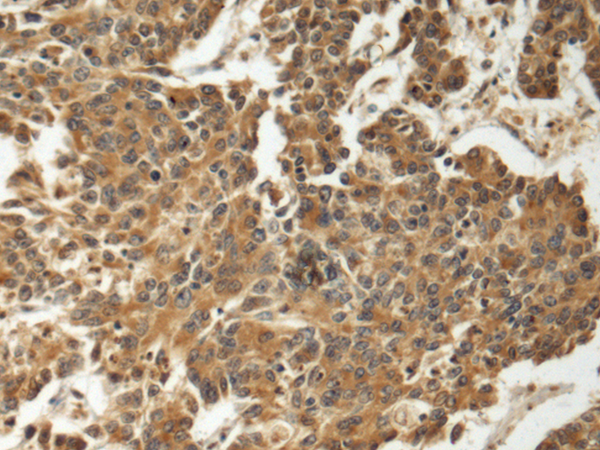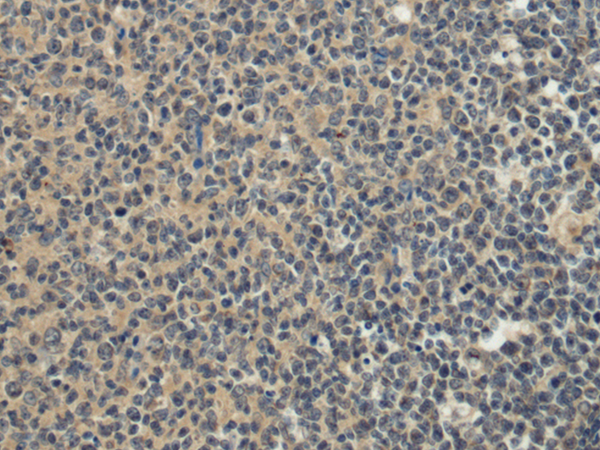

| WB | 咨询技术 | Human,Mouse,Rat |
| IF | 咨询技术 | Human,Mouse,Rat |
| IHC | 1/150-1/300 | Human,Mouse,Rat |
| ICC | 技术咨询 | Human,Mouse,Rat |
| FCM | 咨询技术 | Human,Mouse,Rat |
| Elisa | 1/5000-1/10000 | Human,Mouse,Rat |
| Aliases | FUK; 1110046B12Rik |
| Host/Isotype | Rabbit IgG |
| Antibody Type | Primary antibody |
| Storage | Store at 4°C short term. Aliquot and store at -20°C long term. Avoid freeze/thaw cycles. |
| Species Reactivity | Human, Mouse |
| Immunogen | Fusion protein of human FCSK |
| Formulation | Purified antibody in PBS with 0.05% sodium azide and 50% glycerol. |
+ +
以下是关于Fc工程化抗体(假设“FCSK”为Fc相关抗体)的参考文献示例,涵盖其设计、机制及应用:
---
1. **文献名称**:*Fc-engineered antibodies: Optimization of antibody therapeutics by manipulation of the interaction with Fc receptors*
**作者**:Strohl, W.R.
**摘要**:综述了通过Fc结构域工程化改造增强抗体效应功能的策略,包括增强ADCC、CDC及延长半衰期,并探讨其在癌症和自身免疫疾病中的应用潜力。
2. **文献名称**:*Properties of human IgG1s engineered for enhanced binding to FcγRI*
**作者**:Chu, S.Y., et al.
**摘要**:研究通过定点突变改造IgG1的Fc区域,提高其与FcγRI的亲和力,实验显示改造后抗体显著增强单核细胞介导的肿瘤细胞杀伤活性。
3. **文献名称**:*The role of Fc-FcγR interactions in IgG-mediated microbial neutralization*
**作者**:Bruhns, P., et al.
**摘要**:探讨Fc与Fcγ受体相互作用在抗体中和病原体中的机制,强调Fc工程化对抗体抗感染疗效的影响。
4. **文献名称**:*Glycosylation of antibody therapeutics: Optimization for purpose*
**作者**:Jefferis, R.
**摘要**:分析糖基化修饰对抗体Fc功能(如半衰期、效应功能)的调控,提出通过糖工程化优化治疗性抗体效果的策略。
---
注:若“FCSK”特指某靶点或技术,请提供更多背景信息以便调整检索方向。
Fc-engineered antibodies, often referred to in contexts like FcSK (Fc-silent or Fc-modified) antibodies, represent a class of therapeutic antibodies optimized for enhanced specificity and reduced off-target effects. Traditional antibodies comprise two functional regions: the Fab region, which binds antigens, and the Fc region, which interacts with Fc receptors (FcγRs) on immune cells, triggering effector functions like antibody-dependent cellular cytotoxicity (ADCC) or complement activation. While these functions are beneficial in oncology (e.g., tumor cell clearance), they can cause harmful inflammation in autoimmune or inflammatory diseases.
Fc engineering involves modifying the Fc domain to either enhance or suppress its interaction with Fc receptors. For example, Fc-silent antibodies are designed with mutations (e.g., L234A/L235A or N297A) to minimize FcγR binding, thereby reducing immune activation—useful in autoimmune therapies like anti-CD40L for lupus. Conversely, Fc-enhanced antibodies, through glycoengineering or amino acid substitutions (e.g., afucosylation), boost ADCC for cancer applications, as seen in obinutuzumab (anti-CD20).
Recent advances include tuning Fc affinity for specific FcγR subtypes to balance efficacy and safety. Such engineering also improves pharmacokinetics by modulating pH-dependent FcRn binding, extending half-life. FcSK antibodies highlight the shift toward precision biologics, enabling tailored immune modulation across oncology, autoimmunity, and infectious diseases. Ongoing research explores bispecific formats and combination therapies to expand therapeutic potential.
×